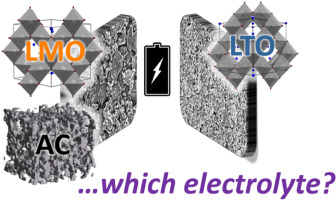Electrochimica Acta ( IF 5.5 ) Pub Date : 2020-01-22 , DOI: 10.1016/j.electacta.2020.135760 H. Shim , Ö. Budak , V. Haug , M. Widmaier , V. Presser

|
We explore different electrolytes containing lithium perchlorate (LiClO4) and lithium bis(trifluoromethylsulfonyl)imide (LiTFSI) salts in various solvents at different temperatures to associate the electrochemical stability of lithium titanium oxide (LTO)/lithium manganese oxide (LMO)-activated carbon (AC) composite li-ion hybrid supercapacitors. By varying the solvents and operation temperature, we were able to detect a correlation between the electrochemical performance and the conductivity of each electrolyte. To test the electrochemical stability and longevity of the electrolytes in such a system, full-cells were analyzed via a voltage floating for 10 h at charged state (2.8 V) of the full-cell. Energy and power performance were the highest for acetonitrile (ACN) containing electrolytes due to its high lithium-ion conductivity. Additionally, the longevity of LiClO4 in 3-methoxypropionitrile (3-MPN) was superior to the performance among the electrolytes tested at ambient temperature with 97% capacity retention and energy efficiency of about 86% after 500 h of voltage floating. The test at 60 °C and 75 °C showed outweighing the performance of LiClO4 in a mixture of ACN and ethylene carbonate (EC) with 70% capacity retention after 500 h voltage floating, with a corresponding energy efficiency of ∼85%, and 50% capacity retention after 250 h voltage floating, respectively. The longevity of LiTFSI in ACN and LiClO4 in 3-MPN electrolyte demonstrated capacity retention of 97% and 92% after 500 h voltage floating, respectively, at low temperature (−10 °C).
中文翻译:

2.8 V–Li-离子混合超级电容器在不同温度下的有机电解质的比较
我们探索了包含高氯酸锂(LiClO 4)和双(三氟甲基磺酰基)酰亚胺锂(LiTFSI)盐在各种溶剂中于不同温度下结合锂钛氧化物(LTO)/锰酸锂(LMO)活化碳(AC)复合锂离子混合超级电容器的电化学稳定性。通过改变溶剂和操作温度,我们能够检测出电化学性能和每种电解质的电导率之间的相关性。为了测试这种系统中电解质的电化学稳定性和寿命,通过在全电池的充电状态(2.8 V)下浮动10小时的电压来分析全电池。含乙腈(ACN)的电解质由于具有高的锂离子传导性,因此其能量和功率性能最高。另外,LiClO 4的寿命长3-甲氧基丙腈(3-MPN)中的氯丁酸在环境温度下的测试性能优于电解质,在电压浮动500小时后的容量保持率为97%,能量效率约为86%。在60°C和75°C下的测试表明,在ACN和碳酸亚乙酯(EC)的混合物中,LiClO 4的性能优于电压浮动500 h后具有70%的容量保持率,相应的能量效率为〜85%,并且250 h电压浮动后,容量保持率分别为50%。在低温(-10°C)下浮动500 h后,ACN中的LiTFSI和3-MPN电解质中的LiClO 4的寿命分别显示了97%和92%的容量保持率。











































 京公网安备 11010802027423号
京公网安备 11010802027423号